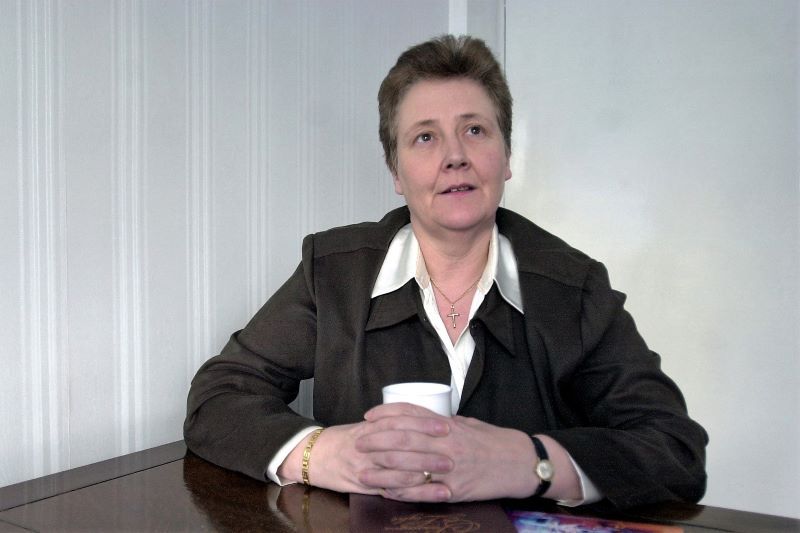Marie Collins, an Irish survivor of child sexual abuse and a former member of the Pontifical Commission for Protection of Minors, is voicing her disappointment after the Vatican this week published revisions of its penal codes.
Pope Francis signed the Apostolic Constitution entitled “Pascite Gregem Dei” (”Tend the Flock of God”) on May 23 which introduces changes to canon law that come into effect this December 8.
The revisions, the first since Pope John Paul II approved changes in 1983, only make changes to Book VI, the penal law section of the Church's canon law.
Speaking with Pat Kenny on Newstalk FM in Ireland on Wednesday, Collins said: "If you take the headlines out of it, as we've seen in many newspaper articles, it looks very good, it looks as if the Church is moving on.
"But if you read it in detail, it's not."
Collins takes issue with the language used through the 21-page document which dictates the punishments a perpetrator 'can' face, as opposed to 'will' or 'must' face for their offenses.
Collins said: "No word of it 'will' be applied or it 'must' be applied."
“The one that really sticks with me, as far as abusing a child is concerned, it says that a priest ‘can’ be removed from office, he ‘can’ be laicized, ‘where the case calls for it.’
“Now that wording, to me, means that it will be left to a judgment call to the individual bishops how they actually punish a priest, which means you don’t have any consistency or standard across the Church.”

Marie Collins, pictured here in 2001. (RollingNews.ie)
Read more
Diminished punishments
In particular, Collins and Kenny discussed Canon 1324 which says that the perpetrator’s “punishment must be diminished, or a penance substituted in its place” if the offense was committed by "one who was lacking the use of reason because of culpable drunkenness,” “one who acted in the heat of passion,” “a minor who has completed the sixteenth year of age,” or “one who acted against another person who was gravely and unjustly provocative.”
Collins said: “Who judges all of this? Provocative?
"It shows the mindset still where, in the case of against an adult female, ‘well she could have been a temptation because she was so provocative.’ And they also think that way about children.
“Nothing in the wording there shows any change of attitude.”
Collins added: “It’s all emphasizing how you can reduce the penalty.”
"It's all these caveats," Collins says, "they litter this document.
Child abuse as adultery
Collins said that one part which really angered her is the portion that says: “If a priest commits an offense against the sixth commandment of the Decalogue with a minor - now, the sixth commandment is 'thou shalt not commit adultery - what does committing adultery have to do with child abuse?
“And by saying ‘with a minor,’ it is suggesting that the minor is a willing participant or somehow giving consent.
“To commit an offense, to commit adultery, under the heading of adultery, with a minor, that’s just inappropriate and absolutely has no place here.”
She added: "To consider abuse against a child as being an offense against the sixth commandment ... is offensive to any child who has been abused, any person who has been abused as a minor, and yet it's still in there.
"It makes me very angry," she said, later adding: “As a survivor of abuse as a child, it bothers me that I’m still being lumped in under the ‘thou shall not commit adultery.’ "
Read more
Zero tolerance and mandatory reporting
“The point is, the survivors over decades now, have been looking for zero tolerance and that is, that any priest who abuses a child no longer remains a priest," Collins said.
"There was a summit a couple of years ago in Rome of all the bishops from around the world and zero tolerance was promised and it has not shown up in this.
“There is no promise that someone will be removed as a priest if they abuse children."
Collins acknowledged: “In my view, there are some things in it that are good - obviously extending the abuse to grooming and pornographic images, etc - but nothing as far as the penalties are concerned. They are still not mandatory, they are still up to an individual if they should decide whether they should impose them or not.
“In some cases, it even says that penalties don’t have to be made public,” Collins said, adding, “it’s a very disappointing document, no zero tolerance, no mandatory reporting.”
Very disappointing
“I’m a Christian and a Catholic and I’m very happy to see someone be remorseful for their offense, but it doesn’t mean they don’t deserve to be punished for it. Yet, that is still here.
“It seems they haven’t learned anything. They’ve learned enough to be able to add more senses and expand what is covered, but as far as penalties are concerned, they have pulled back from the brink of making the changes that were so necessary. It’s very disappointing."




Comments